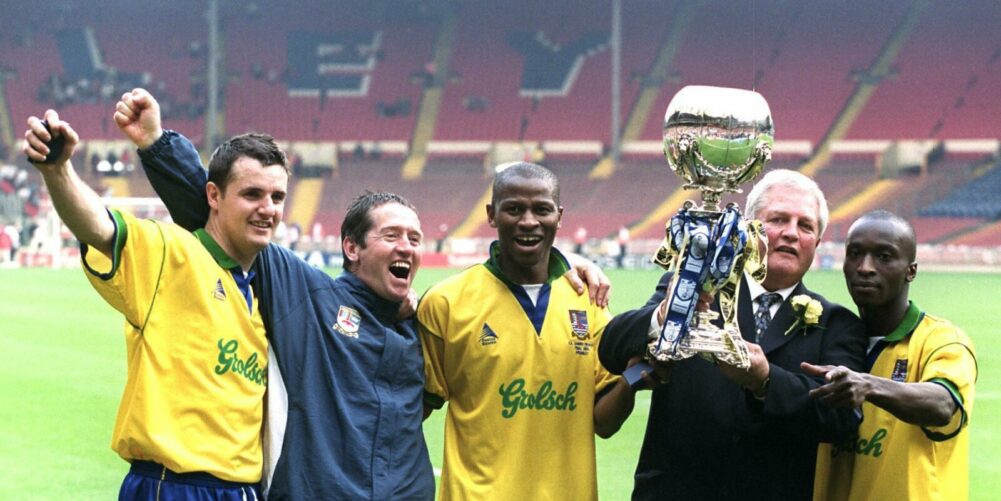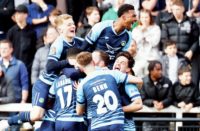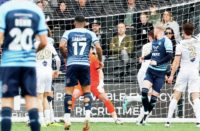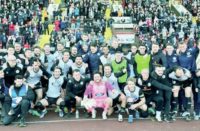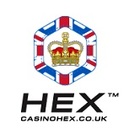As we head towards May and an unlikely showpiece final at Wembley with football suspended amid the coronavirus crisis, Mark Stillman looks back on five decades of the FA Trophy history. In Part 3 of our series, we take a trip to the 1990s when one man made himself something of a Non-League Wembley legend…
Geoff Chapple had a dream as a teenager but not even he could have imagined it to pan out like it did.
“As a 14-year-old schoolboy we were given an essay to write the two things we most wanted in life,” he told The Non-League Paper. “Mine were to own a BMW and play football at Wembley.
“I've since had about five BMWs. I didn't get to play at Wembley but I had the next best thing!”
Didn't he just. Having been manager of Woking since 1984, the Cards had only progressed past the last 16 once during his tenure before a magical run to Wembley in 1994, the first of five successes for the former forward under the Twin Towers.
Their first appearance was confirmed after a semi-final replay win over Enfield at Adams Park, Wycombe, having drawn 1-1 across two legs. It proved to be an emotional experience for Chapple.
“I drove up to my late parents' house after the game. They died before I took over at Woking.” he said.
“It was 3am. I was so chuffed to get to Wembley that I wanted to feel close to them, be where I spent most of my life.
“I must admit I shed a few years. I got home an hour later and recorded the ClubCall line, we used to make about £1500 a month from people ringing in.
“I still remember saying at the start: The dream is now a reality. Woking are going to Wembley.”
Goals from Dereck Brown and Darran Hay helped them defeat Runcorn 2-1 in the final, a scoreline they replicated a year later over Kidderminster Harriers where Scott Steele's first-minute curler and Colin Fielder's extra-time header made it back-to-back glory for the Surrey side.
“We didn't think we could emulate the previous year, but it gives you a liking for it.” said Chapple. “We had an excellent team playing total football, just how I wanted it.
“I used to think of everyone who had been in there before me when I walked into the Wembley dressing rooms. Pele and all that, the World Cup winners. The place was special. It made the hairs on the back of your neck tingle.”
After a blip saw them knocked out in the first hurdle by Carshalton Athletic, Woking recovered for a third final in four years in 1997.
Comedian
Whilst Dagenham saw off Gloucester at Slough, Watford's Vicarage Road was setting for the Cards' 2-1 victory over Stevenage Borough, in the last ever semi-final replays.
In the final, the 63rd minute dismissal of Dagenham's Tony Rogers proved pivotal, as Hay netted in extra-time to take the trophy back to Kingfield.
Despite his hero status and scoring two of his 124 Woking goals at Wembley, Chapple confirmed Hay was still forgotten about after one final.
“We left Darran behind one year,” he laughed. “We had a designated coach to get back for the celebration at Woking and I think he was in the toilet.
“He came in about two hours later saying ‘it cost me £80 to get here!'”
The preparations for Woking weren't as disorganised as forgetting a star player.
“It's life-changing for a brief period of time.” Chapple said. “I was getting dragged around the TV studios at half 6 in the morning.
“It's not so much the game itself, it's the aftermath and build-up to it as well.
“I had a good tie-up with the Army at Aldershot. They looked after us fantastically. I used to bring a comedian in too to keep the players amused.
“We felt like royalty going up on the day. It was a different life for three or four hours, the same when we had cup runs.”
It was a different club for Chapple when he next turned up at Wembley. Having realised his own teenage dream, he made Kingstonian's outgoing secretary Bill McNully's true by winning promotion in his first season in charge, having told the new boss he wished to see his club in the Conference.
McNully told Chapple he wanted more. “Shortly after we won the league Bill said: ‘I didn't tell you the whole truth. Before retiring there's one other thing I'd really like – I'd love to go to Wembley.'
Honour
“After we went there I said: ‘You've been there twice – have a good retirement!'”
The K's closed out the decade with their first Wembley appearance since 1960. They beat the previous year's winners Cheltenham in the semi-finals before Tarkan Mustafa's first-half winner saw them edge past fellow first-time finalists Forest Green Rovers.
Chapple concluded: “It's the most marvellous competition. That and the FA Cup still mean so much to me. I have wonderful memories of the Trophy. I'll never forget them.”
It speaks volumes that Chapple's achievements eclipse two other sides replicating Wealdstone's double of 1985.
Martin O'Neill led Wycombe Wanderers to FA Trophy successes in 1991 and 1993. Their 1991 triumph was witnessed by 34,842 at Wembley, a then-record attendance for the final, with only First Division sides Arsenal, Liverpool and Manchester City recording higher crowds that day.
Two years later, their 4-1 win over Runcorn was made sweeter as it coincided with a first ever promotion to the Football League, where they remain to this day.
In between, Colchester lifted the trophy in 1992 soon after ending their two-year absence from the Football League, in a year of firsts.
It was the first time the competition received a sponsor – Vauxhall – and midfielder Jason Cook had the unwanted honour of being the first player dismissed in an FA Trophy final, after Mike Masters became the first American to score at Wembley.
Cook was ineligible for a winners' medal but Eamonn Collins presented him with his.
While those three contests attracted around 100,000 spectators, the 1996 event saw just 8,672 see Macclesfield Town overcome Northwich Victoria 3-1, the lowest for a Trophy final at Wembley to date.
The 1996-97 competition saw the end of multiple replays. A last-16 tie between St Leonards Stamcroft and Colwyn Bay became the last to go to a third game, with Bay prevailing 2-1 before losing to semi-finalists Stevenage Borough.
From the following season, penalty shoot-outs were introduced if required. In that year's first qualifying round replays, Whitby Town v Netherfield and Bilston Town v Paget Rangers were the first to be decided on this method, both hosts holding their nerve to win 4-3.
Next time, we cross into the 21st century, where the FA Trophy final went on a whistle-stop tour to Villa Park and the Boleyn Ground. Underdogs flourished and one man did his best to copy Chapple's love affair with the competition.
1990s finals
1989-90 Barrow 3-0 Leek Town
1990-91 Wycombe Wanderers 2-1 Kidderminster Harriers
1991-92 Colchester United 3-1 Witton Albion
1992-93 Wycombe Wanderers 4-1 Runcorn
1993-94 Woking 2-1 Runcorn
1994-95 Woking 2-1 Kidderminster Harriers (aet)
1995-96 Northwich Victoria 1-3 Macclesfield Town
1996-97 Dagenham & Redbridge 0-1 Woking (aet)
1997-98 Cheltenham Town 1-0 Southport
1998-99 Forest Green Rovers 0-1 Kingstonian
FA Trophy trivia
- Kenny Gordon's brace in the 1990 final was his final match for Barrow. He emigrated to Australia three months after their 3-0 win over Leek Town.
- In the following season's competition, Seaham Red Star saw their manager, assistant and physio, plus three players, red carded in their 2nd qualifying 2-0 loss at Frickley. The referee was Mike Riley, current general manager of the PGMOL.
- Ken McKenna netted in Runcorn's 1993 semi-final first leg success over Witton Albion to help earn a trip to Wembley. McKenna had only joined a month earlier and doubled up as the club's commercial manager so he was fully responsible for bringing in added funds!
- Poole Town's 9-0 defeat at Chertsey in the 1995 first qualifying round remains their record defeat in the competition. It fell within a season where they gained one point from 42 Southern League South games, losing 39 consecutive games in the division and conceding 188 goals.
- Woking, whose previous six FA Trophy matches had contained 12 goals, beat Folkestone 8-4 in a remarkable third round tie in January 1999. Four of the Cards' goals arrived in the last 10 minutes.
Make sure you get your copy of The Non-League Paper on Sunday for the latest news from across Non-League over the last seven days on the growing impact of the coronavirus on the game and society.

